2016 Disability Day at the Capitol - Vote Disability
GCDD celebrated the 18th annual Disability Day at The Capitol on Feb. 18, 2016 in Downtown Atlanta. It was also announced that this would be the last Disability Day. We have been honored to have a strong disability and advocacy community join us for the past 18 years and advocate for inclusive and integrated communities. Watch the legacy of the Disability Day of the Capitol and let's celebrate 18 years of tradition and continue advocating for a better Georgia.
Governor Nathan Deal gave his annual keynote to the crowd at Disability Day, while Ted Jackson, from the California Foundation of Independent Living Centers, motivated the crowd to vote this election season. Listen to their speeches below or you can read them here:
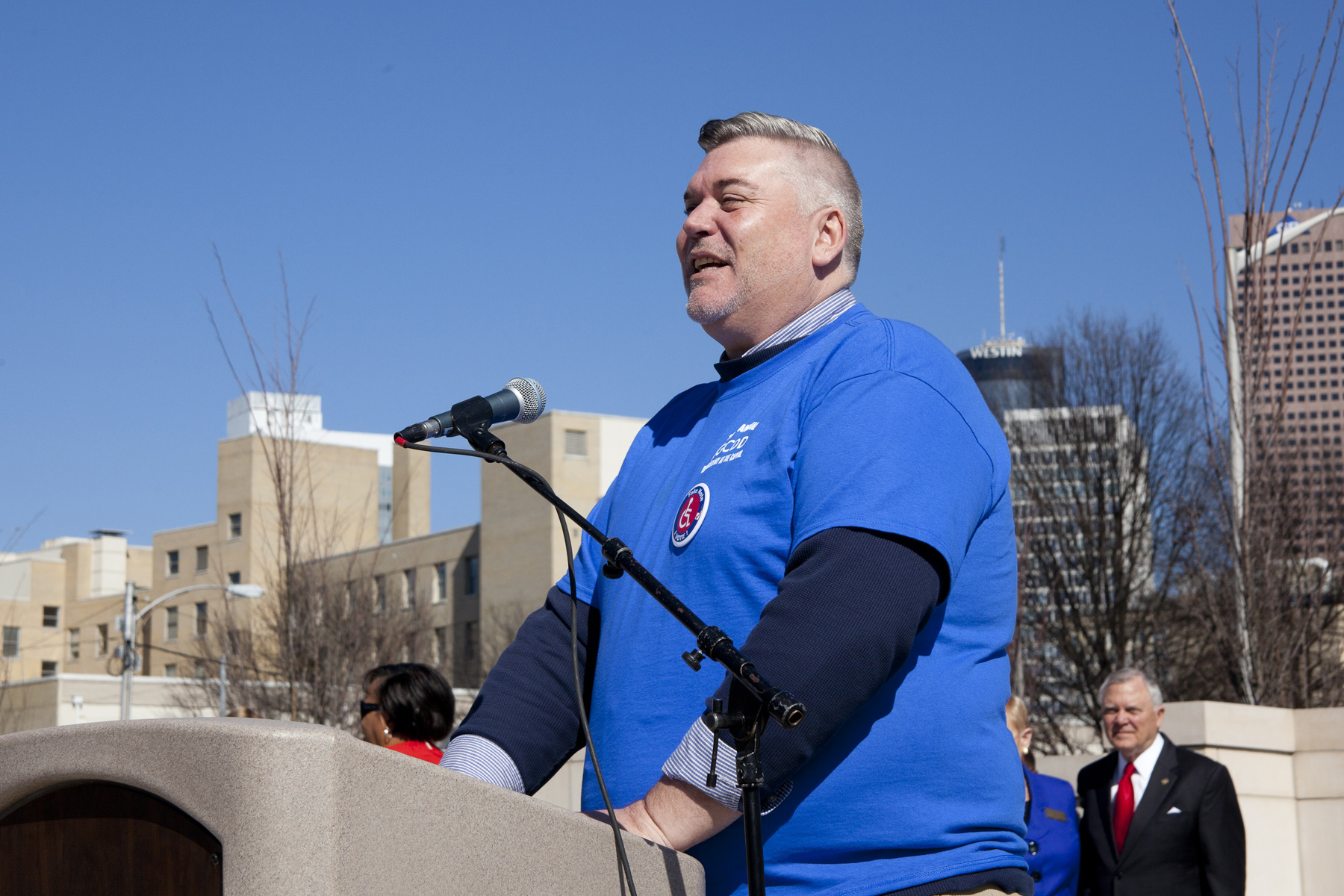 Ted Jackson Speaks at Disability Day 2016
Ted Jackson Speaks at Disability Day 2016
Thank you very much and thank you all for welcoming me so warmly to the Peach State. I bring you salutations and sunshine from the Golden State.
I can’t tell you how excited I am to be here in one of the birthplaces of the civil rights movement with such rich history in protecting the individual’s right to be free and independent. It’s great to be here in Olmstead country. I’m so thankful for Mark Johnson at the Shepherd Center and Eric Jacobson from the Georgia Council on Developmental Disabilities for bringing me out here today. I want to say a special thanks to Linda Pogue from Disability Link for hosting me [cheers] at her center yesterday to meet with folks and discuss how we can increase Georgia’s disability vote and build electoral power which is something we will be hearing out later today. Your southern hospitality has lived up to its legendary reputation.
So at home in California I work for the California Foundation for Independent Living Centers; what we fondly call CF. At CF I am organizing a statewide community organizing network called the Disability Organizing Network, or for short the DO Network because we like to get things done. They organize for access wherever people with disabilities live, work, learn, shop, play, and vote. Voting is really important to us and I’m hoping that voting will be important to you too.
At the DO Network we started a little tradition last year when we all get together and I am going to share it with you. As Eric told you I have been doing some type of community organizing for the past 30 years. I actually started organizing in faith circles and in the church. How many people here go to church? [Cheers] Awesome. So ya’ll are familiar with an altar call right? Alright. So in California instead of an altar call when we all get together, we have an ADA call. In an ADA call the person at the podium says “can I have an accommodation” and everyone screams and yells so we are going to try this.
Can I get an accommodation? I know you can accommodate me better than that. Can I get an accommodation? That is awesome. And we will do that whenever we get excited, just yell “can I get an accommodation” and everyone is going to yell.
So you know it seems like life keeps presenting more and more exciting opportunities these days. One builds into another. Just last year we had the 25th anniversary of the Americans With Disabilities Act. That was exciting wasn’t it? [Applause] People all over the nation got together and shared their memories of life before the ADA, the fight and struggles to get it passed and keep it secure and safe, and our youth gave us a vision of how they will make it stronger over the next 25 years.
There is an excitement in the air for people with disabilities. This is our year. This is our election year. [Cheers] Can I get an accommodation? It will be our election year if we take it for our own.
Just last month the President began his final chapter at the State of the Union. It was apparent people with disabilities owe much to the past several years. We celebrated the Affordable Care Act and protection from discrimination based on preexisting health conditions, the executive order to increase disability employment, section 503, the Vietnam Era Veterans Readjustment and Assistant Act regulations, the Workforce Innovation and Opportunity Act, establishment of the FEMA Office of Disability Integration and Coordination, the 25th anniversary of the Americans With Disabilities Act, recognizing intersectionality of diverse groups through the White House’s Champions of Change programs. Can I get an accommodation? [Cheers] This progress is a testament to our national community power through advocacy.
And yet while the President called out to communities across the nation, we did not hear the word “disability” echo in the House of Representatives chamber. Although we can track progress in our favor we still encounter barriers to recognition and access. These barriers are evident through ongoing struggles to maintain IAHSS program sustainability; confusing building construction standards that seem to decrease access, legislative attempts to chip away at the Americans With Disabilities Act, fast evolving election policy and systems that leave voters with disabilities behind, and an education system that continues to segregate students with disabilities and limits their access to accommodations, delaying graduations and the collegic experience, public transportation systems operating around the ADA, a lack of funding for independent living, inequality in employment opportunities, and too many more examples to mention. Can I get an accommodation? [Cheers]
In this election year we are reminded that there are 36 million eligible voters with disabilities in America. How often do you hear the word “disability” and our concerns discussed on the think tank chit chat sessions of the cable news stations? How often do we hear our elected officials speak to our needs unless we have invited them to an event? Are we being overlooked? Let’s take a look at some numbers.
According to Rutgers University School of Labor and Management (their study on voters with disabilities) we were the second largest minority voting bloc in the 2012 presidential election. African-American voters were 17.8 million, voters with disabilities 15.6 million, and 11.2 million were Latinos. Which of those groups do we see discussed as a voting bloc on the news? We don’t hear “disability” do we? But in recent years we have been closing in on the voter turnout gap between voters with disabilities and voters without disabilities from 11% in 2008 to only 6% in 2012. However if you apply our 2012 turnout to the number of eligible voters from our community only 40% of us voted.
We don’t need to operate at 100% to get the attention we deserve. If you remember from what I said in 2012 we had a 6% gap between our turnout and that of voters without disabilities. That 6% translates roughly to about three million voters nationwide. When you think about it nationwide three million voters isn’t a lot. That 6% is another 60 people for every thousand voters. That is not a huge jump. If we each got another 60 people for every thousand voters in our towns all across this state and in different states across the nation we could make up that three million.
What would an extra three million voters look like? Well we would increase our turnout to 18.6 million voters with disabilities, making our community the largest minority voting bloc in America. [Cheers] And at that point the media and our elected officials could no longer deny the size of our electoral power.
The point of this discussion today is not to draw comparisons or competition between our allies. After all, people with disabilities are black and white, women and men and transgender, Latino and Asian, short and tall, gay and straight, people of faith and people of ideology. We are the ultimate melting pot and the infinite rainbow.
So how do we begin to make this leap? How do we power up for it? By learning from our allies, our older brothers and sisters in social justice and solidarity that came before us. We are learning from the successes of the Suffrage Moment, from the rise of the Union Domination through the Workers Rights Movement, the achievements of the African-American Civil Rights Movement, the accomplishments of the Marriage Equality Movement, and we must take a careful look at the common denominators in the quest for triumph.
Through careful examination of the unifying activity for each of these communities was activating individuals into collective and measureable voting blocks. These groups participated in Get Out The Vote campaigns (what we call “GOTV”) and demonstrated to elected officials the ability to affect election results. This effect didn’t happen overnight for these groups. It took decades of painstaking detail and connecting with voters one-on-one and in blocks, finding out what motives them and using those messages to drive them out to vote.
Beginning in small cells around the nation, each election cycle was an opportunity to grow their capacity larger than the previous election until one day they captured the attention of candidates. Each of these groups can today approach the legislators from across the nation, courts, and Congress, and find a greater amount of success than our own community. In fact, although many of these groups are considered disability allies and partners, we have recently seen ourselves overshadowed sometimes by their goals and objectives. This is what we call “electoral power,” the ability to have a measured and visible effect on elections. This effect allows a community to be actors on the political stage with the elected officials who know that a group can deliver the votes that could determine their own futures in office. This power can be used to hold our officials accountable to the ballot box that elected them.
Communities who invest in building electoral power over time often find themselves on a Governor’s or President’s to-do list. How many of the groups that I talked about today have we seen on the to-do lists of recent presidents? The goal here is not to paint a picture of conflict with our partners but rather to challenge ourselves to build the same type of power for the disability community, to stand with similar footing among fellows, and negotiate for fairness and access with equal strength. Electoral power does not mean that barriers will stop rising in our path but it does mean that we will always advocate from a stronger position to break those barriers and increase access.
It is not coincidence that in the year following the 25th anniversary of the ADA that candidates and voters are talking more about disability than they ever have before. The door has opened for us to elevate ourselves to the next stage in the building of a disability electoral power. Can I get an accommodation? [Cheers]
And finally last year redirecting our energy to learn from the advocacy of the past and change the future. It was a call to action summoning the spirit of the movement’s founders to prepare the way for our youth for future leadership. It was a reminder that people with disabilities are destined for greater power for electoral power.
Folks, we all see the campaign ads. We know that primaries are coming up and an election is going to come up. We know that people are going to ride their donkeys and their elephants to the state houses and the Congress and the White House. But we are going to show them another way because we are going to ride every wheelchair, power chair, paratransit, public transportation system, every pain, Braille, screen reader, all the way into Washington D.C. through the halls of Congress and into the front door of the White House and own it someday.
Now at the beginning of my speech today I examined the presence of disability in the last State of the Union speech of an outgoing president, one to whom we owe much. Now it is time for our community to look to the next president and make sure that we are in the first chapter of their book by organizing this year for electoral power.
On January 20, 2017, will we hear the word “disability” echo at the Capitol from the Mall on the podium? The choice is ours, the vote is ours. Vote disability. Thank you.
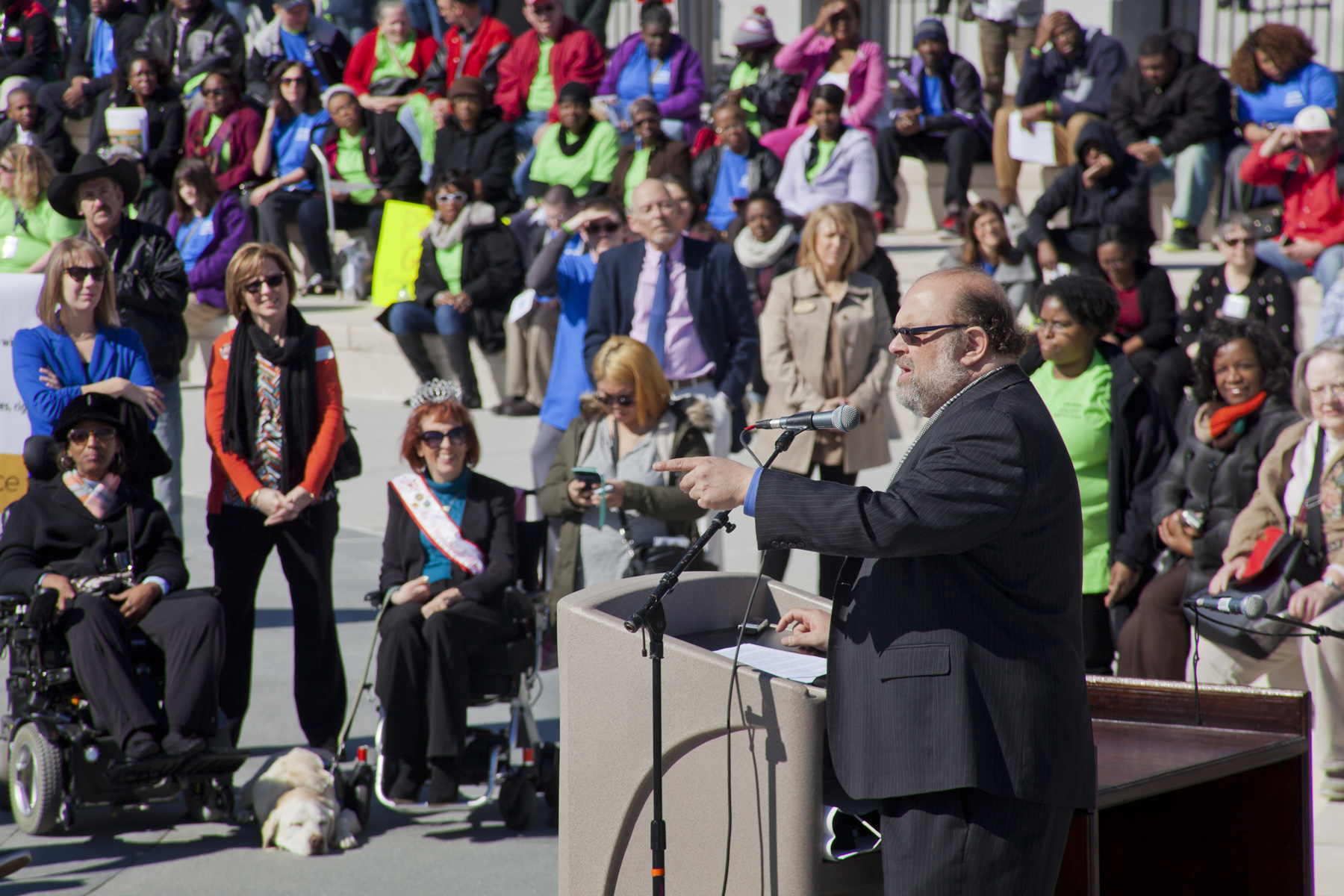 Eric Jacobson Speaks at Disability Day 2016
Eric Jacobson Speaks at Disability Day 2016
I have an important announcement to make. This is going to be our last Disability Day at the Capitol. It’s the 18th but it will be the last. I’m going to let that sink in for a second. This is our last Disability Day at the Capitol.
So we want to thank everyone who had attended the last 18 years. We have actually grown this from the first year - we were talking about this earlier this morning - we had 25 people in a room behind the Secretary of State’s office 18 years ago. Today we were - the last count I had was 3,500 people so it is one of the largest in the state and the largest ruling during the legislative session. But the purpose of Disability Day was always to connect you with your legislator. That can’t happen when we have this big a crowd. We can’t figure out how to do it at the depot, we can’t figure out how to do it here. We want to work on making sure - (how come last year we had rain and it didn’t blow away that much and now everything is blowing away on me?) So we want to focus our efforts on making sure you get connected with your legislators and your elected officials and creating a dialogue about what is happening in people’s lives.
How many of you have attended one of the Advocacy Days this year> Yeah? A few of you. We want you to come back next year and attend those Advocacy Days. We want to see 50, 75, 100 people come, be able to get into the Capitol, and be able to talk with your legislator one-on-one and ask them to support things like the ABLE Act, ask them to support more money for home and community based services, ask them to make sure that we have transportation that is accessible to everyone, ask them on a one-on-one basis to make sure that their doing their job and getting people the things that they need. So we think it’s a much better way of getting connected with people and we’ll still be here to cheer and to shout and to have a good time but let’s really make this about connecting with the folks that we come up here to see.
I want to tell you again about some of the power that we really can have when we are working with our legislators one-on-one. You already hear about the ABLE Act so far in the House budget (and you’ll hear a little bit later we have got increased rates for the Independent Care Waiver program in the budget right now) but I want to tell you about something that you may not know and something that we need to be able to work on and that is that you may not know that the legislature is working on passing civil rights legislation. The first time in Georgia. We don’t have civil rights legislation.
But did you know that disability is not a part of that legislation? Did you know that when they pass that legislation or if they pass that legislation there will be protected classes but disability won’t be one of them? In fact it says that “all persons shall be entitled to full and equal enjoyment of goods, services, facilities, privilege [not] based on race, color, religion, sex, or national origin.” But what about disability?
So it’s one of the things that we need to be asking people about, asking legislators why isn’t disability a part of that? Because it will say you can’t be discriminated in a hotel or a motel or a restaurant or cafeteria or a gas station or a movie theatre or a sports arena. That is civil rights legislation that belongs to you as well. So that is part of the reason that we hope to change the focus of these days so we can have a greater impact on what is happening for folks with disabilities.
Finally what I want to say is that let’s make sure that when you go to the Depot you go to the Disability History Alliance table. This morning I gave them 17 years worth of T-shirts from Disability Day. Tomorrow we are giving them banners from each of the Disability Days. So you go by there. If you have pictures - I know that Heidi brought pictures from an early, early disability day. You’ll see a video up there from all the previous Disability Days but the fact of the matter is we didn’t have anything from the first five years. So if you have stuff from the first five years please get it to us. We’d love to have pictures of that.
We want to make sure that all the history of the disability movement here in Georgia is told and that there is an opportunity for people in later further generations down the line to know the work that you have done over not only these last 18 years but the last 50 years.
Our Sponsors
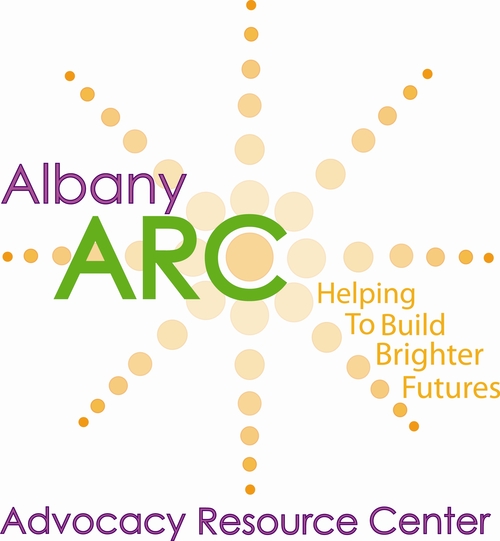
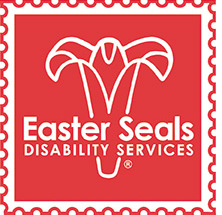


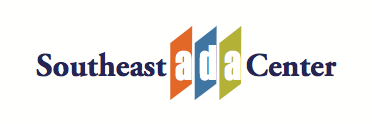


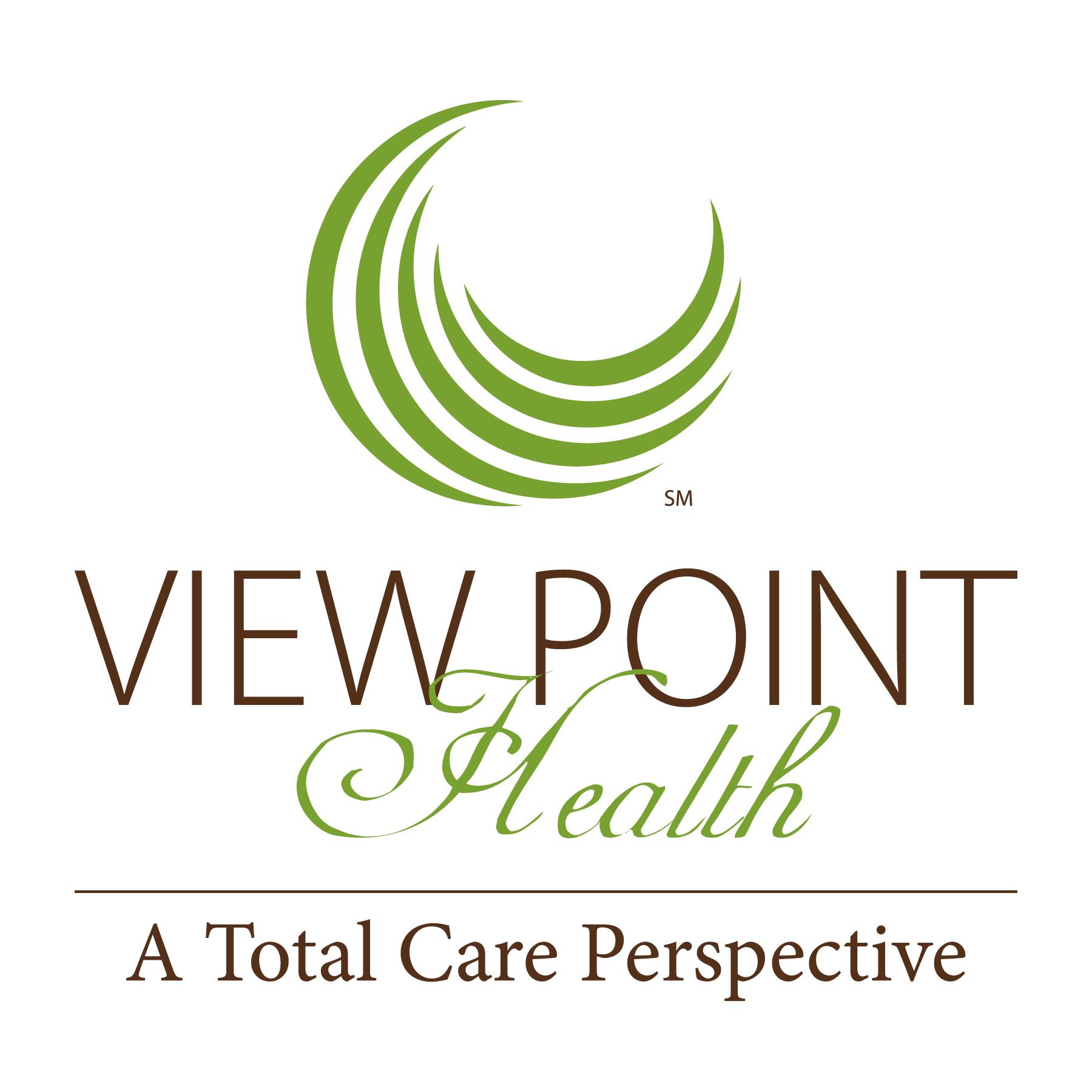
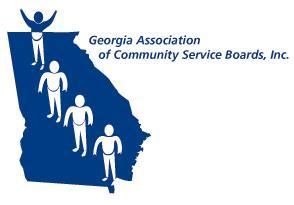

Thank you very much and welcome to Liberty Plaza. I want to extend a thank you to the Georgia Council on Developmental Disabilities for hosting this event today. This is - I understand - the 18th year and I have been honored to be with you - I think - every year since I have been the Governor of this state. Thank you for 18 good years. [Applause]
Your theme this year is disability vote, feel the power. That is an appropriate theme to have in this election year cycle. I would encourage all of you to register to vote and then to use that power to vote in primaries and at the general election. This will be a busy year in all of those cycles of the election process so it is an appropriate time for that to be your theme for the year.
I also want to thank all of those who have sponsored legislation and actually carried your efforts forward in the State General Assembly. For example in my budget this year we are including 100 new NOW waivers [cheers] and over eleven million dollars to support the increased rates for the COMP waiver [cheers]. We remain committed to serving people in the least restrictive environment as possible in order to obtain a high quality of life for everyone in our state.
Another important aspect of what is happening in Georgia is the progress that we are making of being able to enroll students with intellectual disabilities on our college campuses [cheers]. Those colleges currently include Kennesaw State University [cheers], Georgia State University [cheers], East Georgia State College, Georgia Tech, and Columbus State University. There will be others joining these including the University of Georgia.
We all remain committed to making sure that we have progress toward increasing the number of people with disabilities who actually can go to work. I’m happy to support the efforts of Chairwoman Katie Dempsey’s study committee to establish the Georgia Employment First Council. They will recommend to the General Assembly ways in which we can proceed in order to become an Employment First state.
In summary this is our goal: We want people who can live in real communities with real homes with real careers and with real learning opportunities. Thank you very much. I am now privileged to present to you a proclamation recognizing this special occasion. It is a proclamation for Developmental Disabilities Awareness.